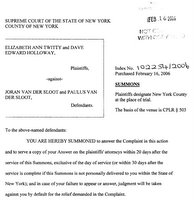 Legislation is a powerful tool - especially if you are the ruler of a small and rich country.
Legislation is a powerful tool - especially if you are the ruler of a small and rich country.Take the case of the Sultan of Brunei.
The Sultan has a younger brother, Prince Jefri Bolkiah, who supposedly embezzled around $ 12 billion during his 13 years as finance minister.
In 2000, the two brothers reached an out-of-court settlement that compelled Jefri to pay back $ 4.5 billion in assets, including properties in Paris, Singapore, Malaysia, Indonesia, Japan, Britain and the US.
It seems that the London-based Jefri never honored the agreement, while continuing his $ 400,000 a month lifestyle.
In the latest court ruling by Chief Justice Mohammad Saied, Prince Jefri has been ordered to sell his London mansion (St John's Lodge in Regent's Park), the five-star New York Palace Hotel in Manhattan, the Bel-Air Hotel in Los Angeles, a property at Place Vendome in Paris, a mansion in Singapore and an undisclosed quantity of cash and jewels.
To ensure this, the monarch changed the Brunei constitution and gave himself the same status as the Pope – he is infallible.
“His Majesty the Sultan ... can do no wrong in either his personal or any official capacity.”
As a result, Prince Jefri has no legal options to appeal the latest ruling – unless he becomes Sultan.
To prevent Prince Jefri blabbing to the press, the following was degreed:
“No person shall publish or reproduce in Brunei or elsewhere any part of proceedings ... that may have the effect of lowering or adversely affecting directly or indirectly the position, dignity, standing, honor, eminence or sovereignty of His Majesty the Sultan.”
A creative legal remedy for sibling rivalry......


